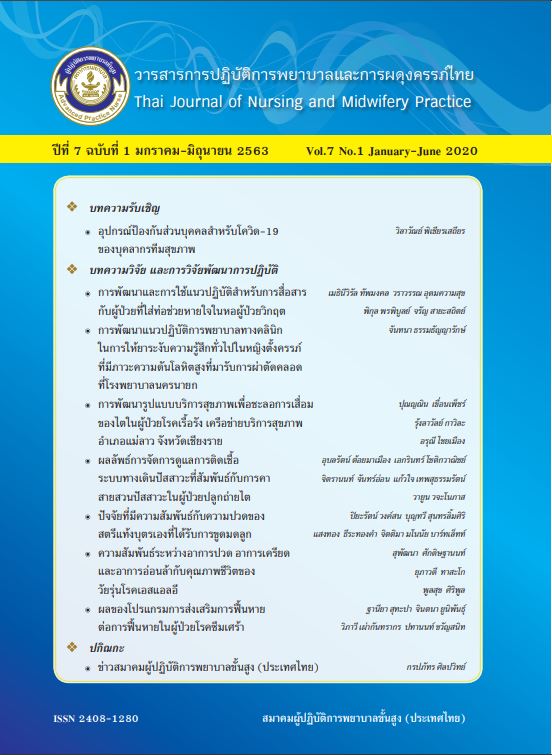Development of Health Service Model for Delaying Kidney Degeneration in Chronic Disease Patients, Health Service Networks of Mae Lao District, Chiang Rai Province
Main Article Content
Abstract
Chronic disease patients with diabetes and hypertension have increasing complications from the chronic kidney disease. An appropriate health service model will decrease complications from the chronic kidney disease. This research and development aimed to develop a health service model for delaying kidney degeneration and studied
outcomes of the developed health service model for delaying kidney degeneration, Mae Lao HealthService Network, Chiang RaiprovinceduringSeptember 2018 to November 2019.Samplesof chronicdiseasepatients with chronic kidney disease comprised of 198 patients in stage 1-3a and 394 patients in stage 2-3 a. Research process was: (1) the
analysis of existing health service situations; (2) the development of health service model for delaying kidney degeneration; and (3) the evaluation of outcomes. Qualitative data were analyzed by contentanalysis. Quantitative data were analyzed by using descriptive and inferentialstatistics. Results showed that:(1) the situation analysis reported the reactive type of existing health service model. Sample shad in appropriate health behaviors and their chronic kidney degenerations were increasing; (2) The development of health service model for delaying kidney degeneration employed the concept of Chronic Care Model (CCM); and (3) Outcomesof theservice model showed that chronic disease patients had consumedless sodium inaday, hadlower serum creatinine levels, and had higherkidney filtration rate with statistically significant (p <0.001). The developed health service model could enhance chronic disease patients in getting access to health service model that delaying kidney degeneration which resulting in good behavioral and clinical outcomes. Long-term follow upshouldbe further study.
Downloads
Article Details
References
World Health Organization. World Health Statistics 2017. 2017(cited 2017 Jan 29); Available from: URL:file:http://www.who.ing/gho/publications/ world_health_statistics/2017/en/.
Aburto NJ, Hanson S, Gutierrez H, Hooper L, Elliott P, Cappuccio FP, etal. Effectoflowersodiumintake on health: systematic review and meta-analyses. BMJ 2013;346:f1378.
Ingsathit A, Thakkinstian A, Chaiprasert A, SangthawanP, GojaseniP, Kiattisunthorn K, et al. Prevalenceandriskfactorsofchronickidneydisease in the Thai adult population: Thai SEEK study. Nephrol Dial Transplant 2010;25(5):1567-75.
Office of Policy and Strategy Ministry of Public Health. Causes of kidney failure. 2013;http://bps. ops.moph.go.th/index:php?mod=bps&doc=5.
Medical Record and Statistics Section, Mae Lao Hospital. Patient information at the diabetes clinic, Hypertension, Mae Lao Hospital, ChiangRai. 2017.
Wagner EH, Bodenheimer T, Grumback K. Improving Primary Care for Patients with Chronic Illness: The Chronic Care Model, Part 2. JAMA 2002; 288(15):1909-14.
PurisoP. The development of activity model “Salty Eating Campaign Week.” Bureau of Nutrition, Department of Health Ministry of Public Health; 2017. (In Thai)
Nephrology Society of Thailand. Clinical practice recommendation for evaluation and management of chronic kidney disease in adults 2015. Bangkok: Nephrology Society of Thailand; 2015. (In Thai)
Nephrology Society of Thailand. Management guide for early chronic kidney disease. Bangkok: Union Ultraviolet; 2015. (In Thai)
Bureauof Non Communicable Diseases. Manual to reduce chronic kidney disease in diabetes and hypertension patients. Nonthaburi: Bureau of Non Communicable Diseases; 2016. (In Thai)
Ministry of Public Health, Nephrology Society of Thailand. Guidelines for screening and treating kidney complications in diabetes and hypertension. Nonthaburi: Bureau of Non-Communicable Diseases; 2016.
National Kidney Foundation. K/DOQI Clinical practice guidelines for chronic kidney disease: evaluation, classification and stratification. Am J Kidney Dis 2002;39(suppl1): S1-S266
Kanfer FH, Gaelick-Buys L. Self management methods. InKanfer FH, Goldstein A (Eds.). Helping people change: A textbook of methods. New York: Pergamon. 1991.pp. 305-360.
Glasgow RE, Davis CL, Funnell MM, Beck A. Implementing practical interventions to support chronic illness self-management. Joint Commission Journal on Quality and Patient Safety 2003 Nov;29(11):563-574.
KawiJ: Self-management support in chronic illness care: a concept analysis. Res Theory Nurs Pract 2012, 26(2):108–125.
US Department of Health and Human Services. The Seventh Report of the Joint National Committee on Prevention, Detection, Evaluation and Treatment of High BloodPressure;2004.
De Martinis JE. Management of client with hypertensive disorders. In: Black JM, Hawks JH, editors. Medical-surgical nursing: clinical management for positive outcomes. vol 2. 8th ed. Philadelphia: Saunders Elsevier; 2009.
Chobanian AV, Bakris GL, Black HR, Cushman WC, Green LA, IzzoJL,etal. Theseventhreportof the Joint National Committee on Prevention, Detection, Evaluation,and TreatmentofHighBlood Pressure: The JNC 7 Report. JAMA 2003;289: 2560-72.PR
Chatyangthon U. District Health Data Center. Provincial Health Office of Phitsanulok. (In Thai)
Ministry Of Public Health, Health Service Development Plan. Development of kidney health service system. Bangkok: The Agricultural Cooperative Federation of Thailand; 2016. (In Thai)
KhanMA, Evans AT, ShahS. Caring for uninsured patients with diabetes: designing and evaluating a novel chronic care model for diabetes care. J Eval ClinPract 2010;16(4):700–6.
Thungtong S. Delayed progression diabetic nephropathy in patients with uncontrolled type 2 diabetes mellitus. Journal of the Royal Thai Army Nurses 2017; 18 (Suppl.): 17-24. (In Thai).


